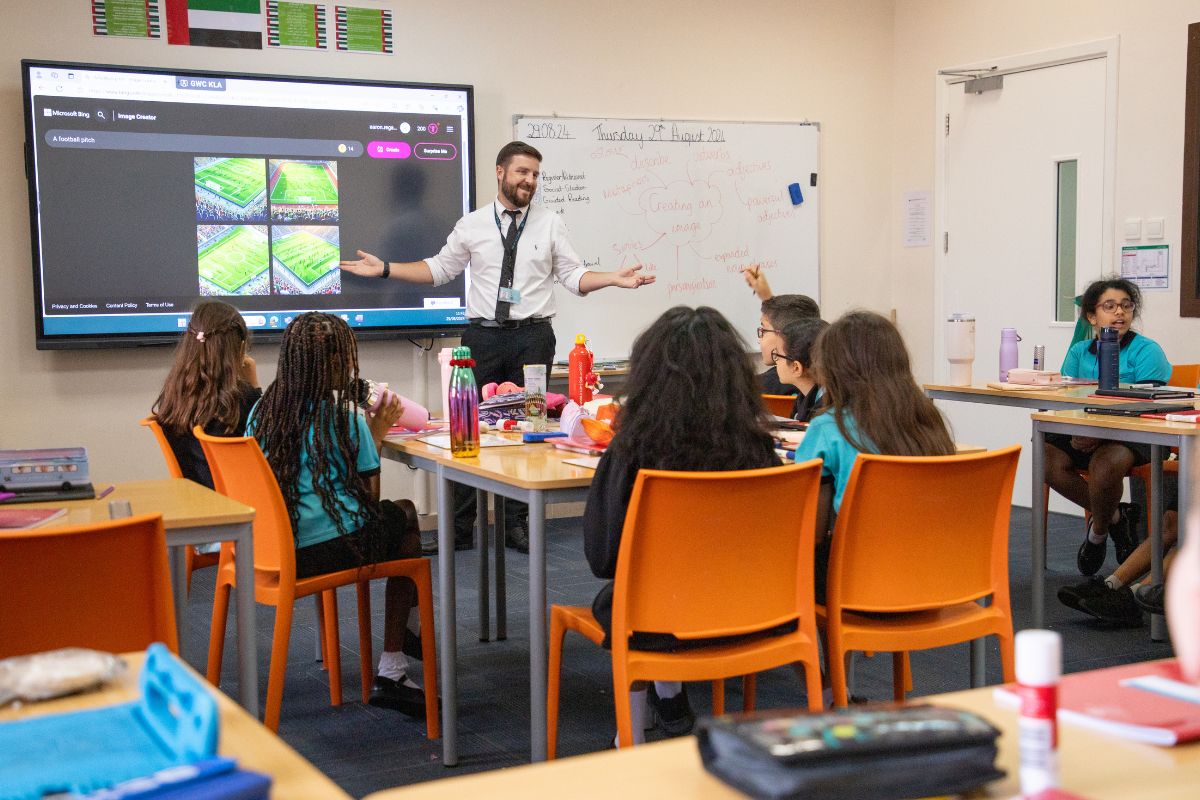
The school is leading the way by using AI to transform education in the classroom
PARTNER CONTENT: Artificial Intelligence (AI) is revolutionising education, making it more tailored and interactive than ever before. As technology evolves, so too does its role in the classroom, from personalised learning experiences to innovative teaching tools.
At The British International School Abu Dhabi (BIS Abu Dhabi), AI is reshaping the educational landscape for both younger and older students, through enhancing learning, addressing common concerns, and preparing students for the future.
“We actually use AI tools more than the students,” says Aaron Regan, a Primary School teacher at BIS Abu Dhabi. “AI helps us create engaging and immersive lessons. For instance, we used AI to enhance our Stone Age topic by creating a virtual Stone Age man who interacted with Year 3 students, giving them tasks, which really sparked their interest.”
Aaron explains that AI is frequently used to generate images and videos that support teaching. While tools like ChatGPT are well-known, there are many AI tools specifically designed for education.
“One example is AI Educator, a website run by Dan Fitzpatrick, which lists regulated AI apps for educational use,” he says. “Among these, Bing Image Generator has been especially helpful for creating visual content, alongside a collection of resources for video generation.”
In the BIS Abu Dhabi Primary School section, the teacher maintains full control over how AI is used, ensuring prompts are carefully crafted to deliver accurate results.
“When using AI, the teacher needs to be specific and nuanced with prompts,” says Aaron, who further explains how he uses AI to enhance lessons, such as helping students visualise their creative writing.
“After writing a setting description, the teacher inputs the work into an image generator, allowing students to see how their imagined scene might differ from AI’s interpretation, adding a new layer of understanding,” he says.
“It’s a really good way of making their writing come to life.” While AI is fully controlled by the teacher in Primary School, the approach shifts in Secondary School, with pupils gaining direct access to AI tools.
Will McLoughlin, a Secondary School maths teacher at BIS Abu Dhabi, explains that AI plays a significant role in personalising learning for older students.
“For example, my colleagues in the Languages Department provide a simple prompt that can make AI tools, like ChatGPT, speak in any language and correct grammar in real time.
“Students receive immediate feedback as they interact with AI, while teachers can provide individual attention,” he says.
“This allows the class to run smoothly, with each student essentially having a one-to-one tutor.
You might also like: Top grades galore! BIS Abu Dhabi shines in GCSE success
Increased student engagement
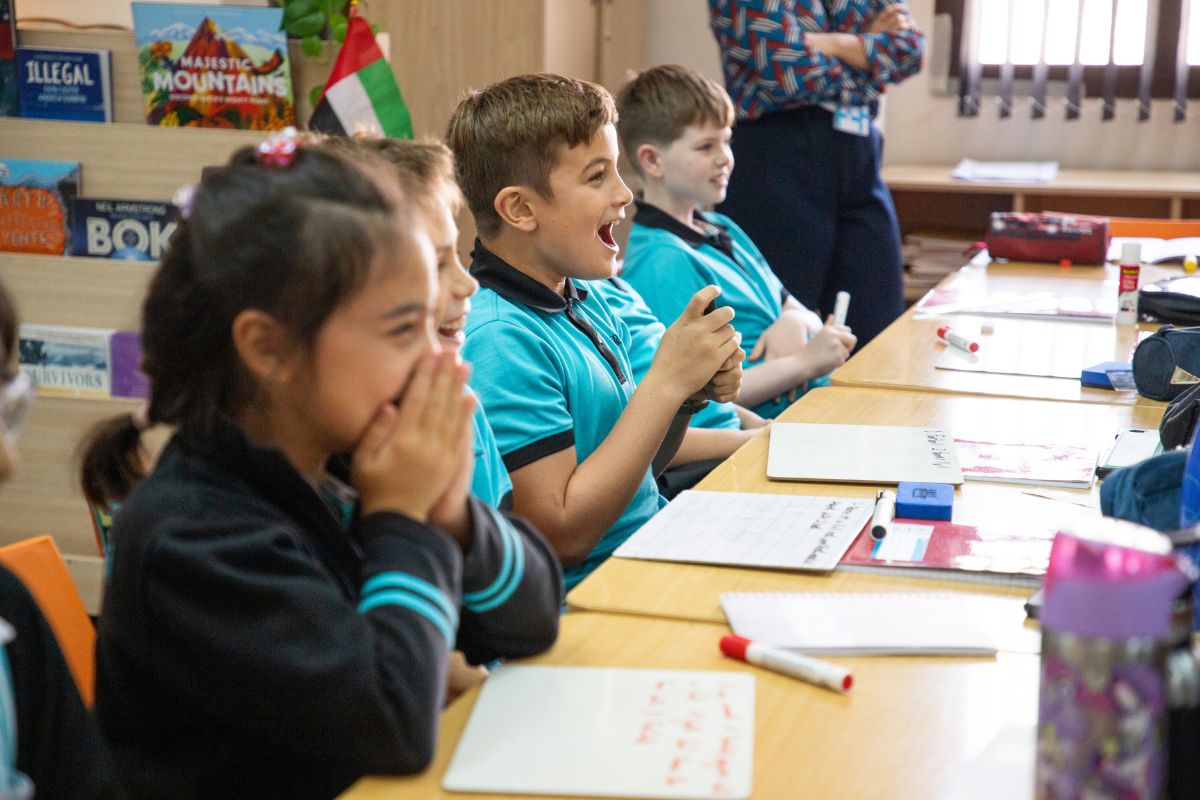
Aaron notes a significant increase in student engagement when using AI as a teaching and learning tool, explaining how AI brings learning to life for students. He emphasises that AI tools allow for more personalised and individualised learning, which naturally boosts engagement.
“When learning is tailored to each student’s needs,” he explains, “it automatically increases their interest. Instead of teaching the entire class the same material, AI helps identify where each student needs improvement, keeping them more engaged.”
He also highlighted how AI has had a noticeable impact on traditionally challenging subjects like writing. “Writing is always hard to get students excited about,” Aaron says, “but I’ve seen a big increase in their love for it, especially with boys. They’re really bringing their writing to life.”
This personalised approach ensures that students are not only engaged but also motivated to improve their work, seeing a clear purpose in what they create. When discussing how AI helps identify learning gaps, Will highlights the role of BIS Abu Dhabi’s homework platforms powered by advanced algorithms.
“The platforms we use have algorithms, partly based on AI, that adapt to the students’ performance. If a student consistently struggles with a particular topic, the platform will automatically provide more structured support the following week,” he explains.
He stresses that, while AI is part of the process, educators still maintain control over the system. “This is AI in a different way than what people, particularly parents, might be familiar with. It’s not about just throwing AI into the mix and hoping it picks up on gaps,” Will says.
“We trust the homework platforms that the school has invested in to get it right, especially in areas like secondary maths. These platforms have shown us direct results, and we’ve seen improvements in addressing learning gaps.”
Getting the balance right
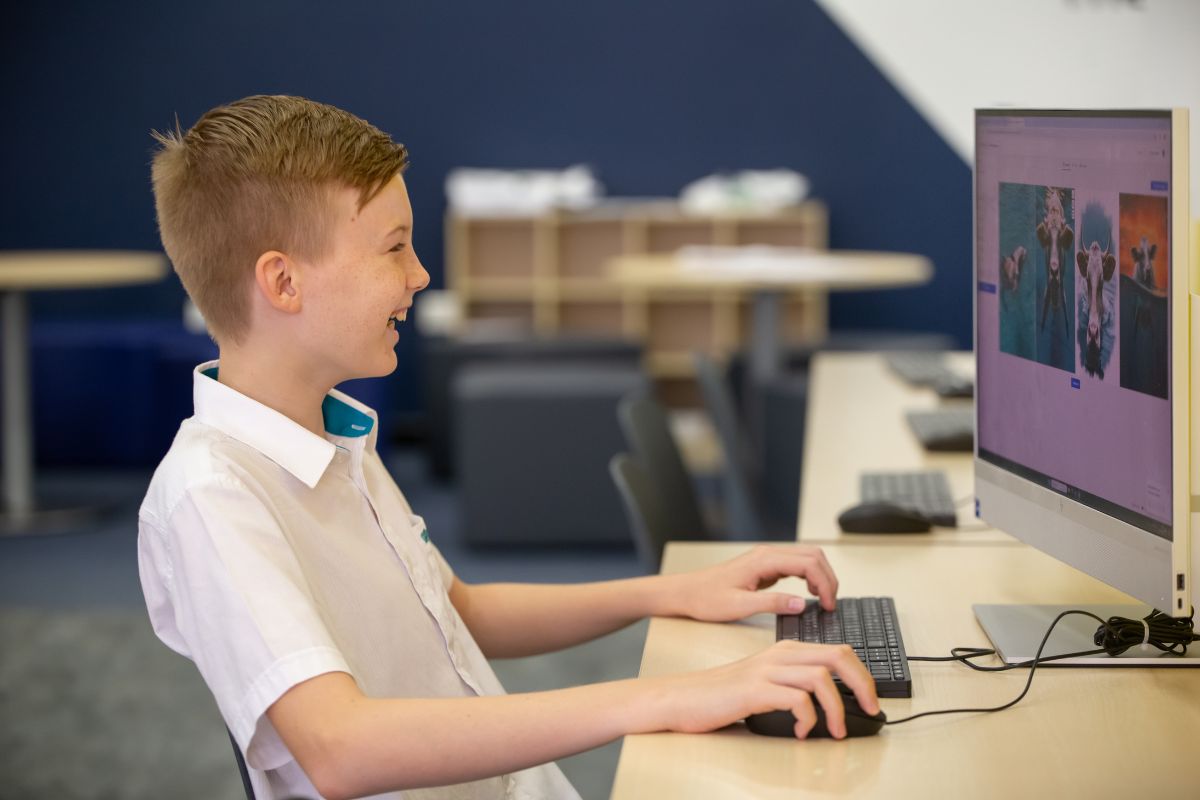
When discussing the balance between AI and the human touch, Will emphasises the importance of knowing when to rely on technology and when a more personal approach is needed.
“It’s about striking the right balance,” he explains. While AI can collect vast amounts of data and provide insights, there are times when a teacher’s instinct and personal touch can make all the difference.
He points out that while AI offers enhanced clarity and empowers educators with better data, it’s the combination of technology and human expertise that leads to the best individualised learning decisions.
Empowering teachers with AI and data skills
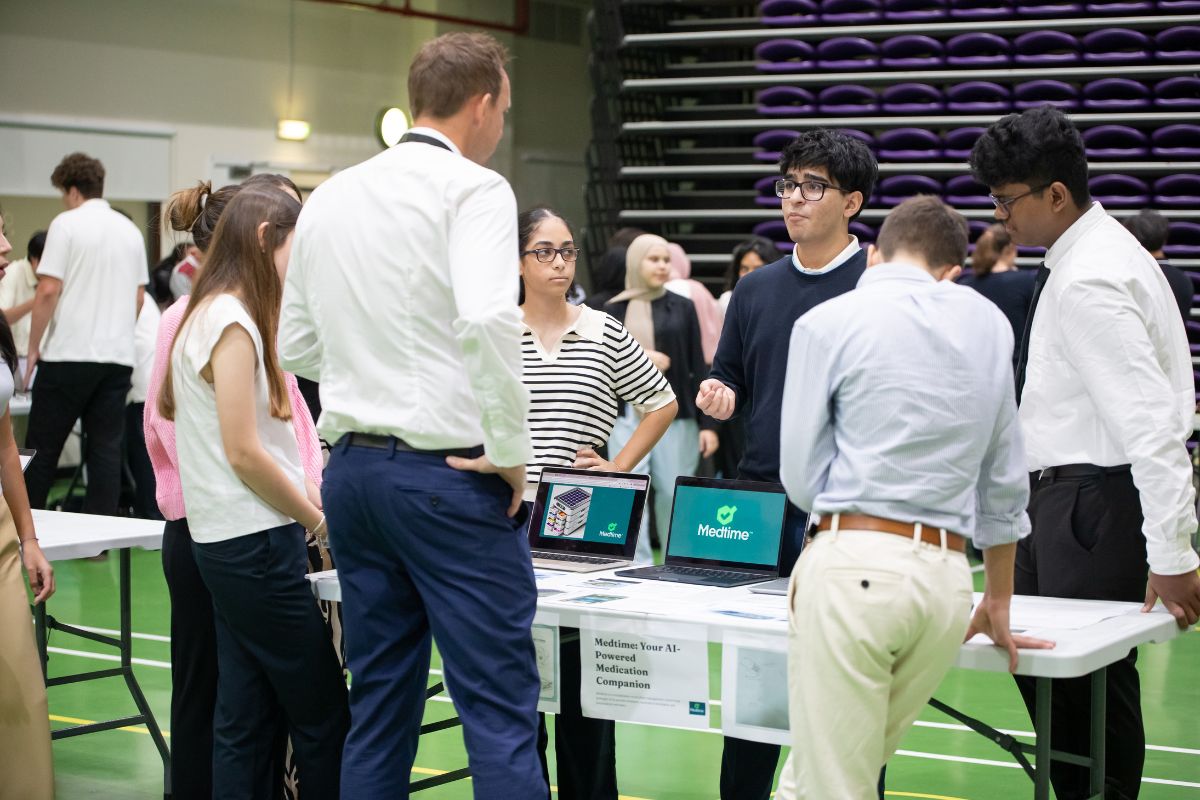
When asked about training and professional development, Will explains that while studying to become a teacher does not fully cover AI and data analytics, BIS Abu Dhabi is proactive in filling that gap.
He mentions that the school was among the first in the UAE to establish an AI policy, which came into effect when the “ChatGPT craze” started.
He notes that professional development at BIS Abu Dhabi includes a coaching model, which plays a vital role in equipping teachers with practical skills, particularly around data analytics.
Will emphasises that these skills, which take years to develop on the job, are crucial in today’s teaching environment.
This coaching model, guided by school leadership, ensures that teachers can analyse student data effectively and make informed decisions.
“With so many students at different levels, having access to detailed analytics helps us know exactly where support is needed,” he explains.
Will also highlights that, as part of Nord Anglia Education, BIS Abu Dhabi staff have access to the online platform Nord Anglia University, where they can engage in various training courses.
“Everyone can log on and learn for themselves,” he adds, explaining how this platform empowers teachers to continuously develop their skills and stay up to date with the latest advancements in education.
You might also like: BIS Abu Dhabi hosts fun orientation events for new families
Addressing parents’ concerns
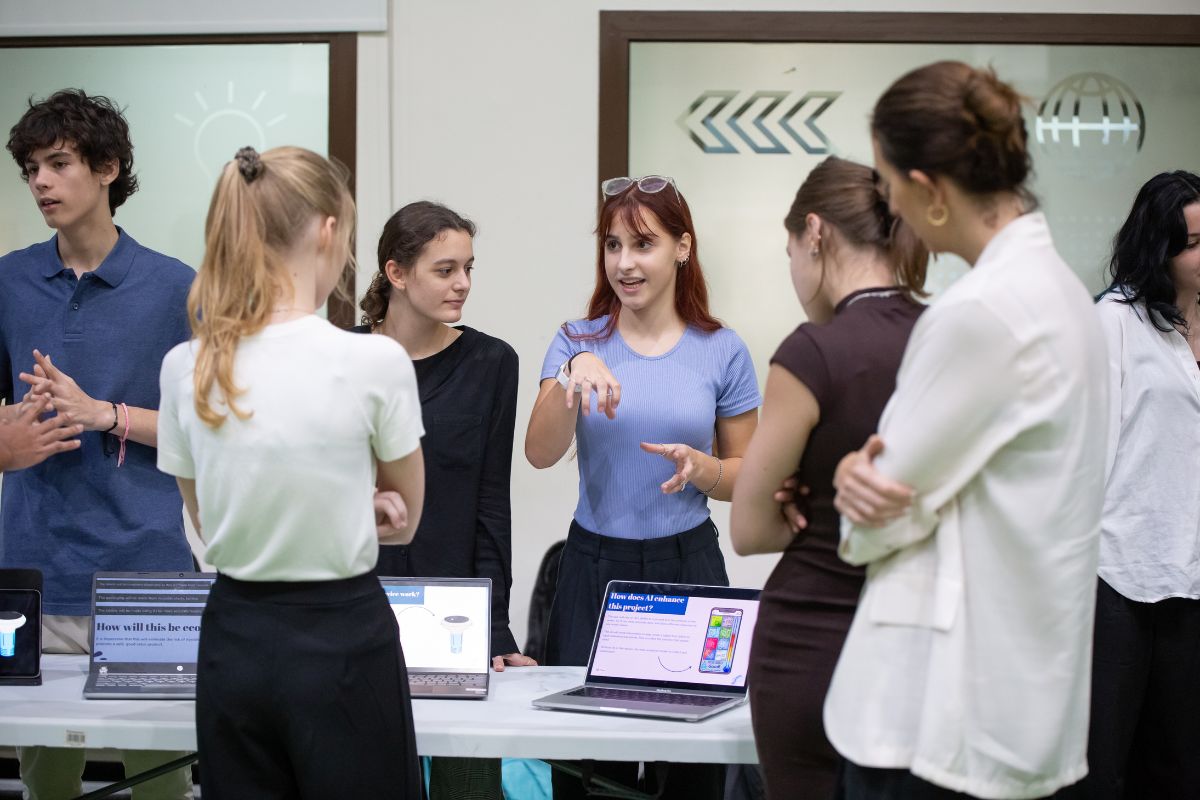
Will explains that parents tend to have two extremes of concern regarding AI in education.
On one hand, some parents fear AI’s impact, worrying it will lead to plagiarism, and even hinder students from thinking independently. These concerns reflect the anxiety that AI could overshadow critical thinking and creativity.
On the other hand, many parents are not fully aware of AI and its potential benefits, and their concerns stem from a lack of understanding. To address these varying perspectives, Will emphasises the importance of transparency.
BIS Abu Dhabi, however, takes a proactive approach by holding parent information sessions to explain how AI is integrated into the curriculum.
“We allow the parents not only to understand that we use AI, but how we use it,” Will notes, adding that these sessions help clarify the role of AI in lessons. Aaron adds that in the Primary School, concerns are minimal because younger children are not using AI tools directly.
“They’re using it as a whole class tool,” he explains, noting that AI is more of an instructional aid at that level rather than something the students interact with individually. AI is reshaping education at schools like BIS Abu Dhabi by sparking greater student engagement and equipping teachers with innovative tools.
With thoughtful training, educators can fully embrace these advancements, while addressing parents’ concerns ensures a smooth transition.
As AI continues to evolve, its impact on making learning more dynamic and effective becomes increasingly evident.
For more information, visit Nord Anglia Education
Follow Yalla for all the latest education news
